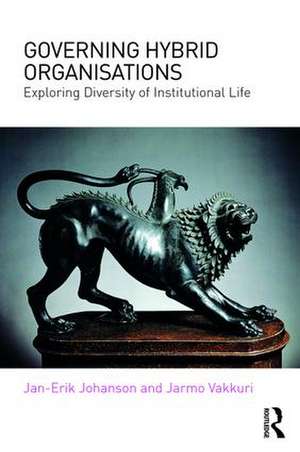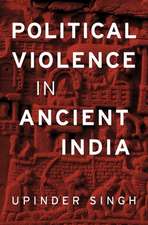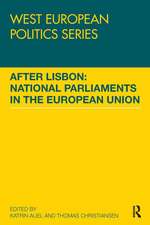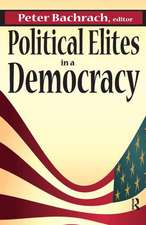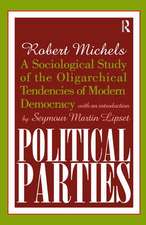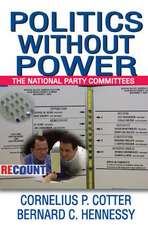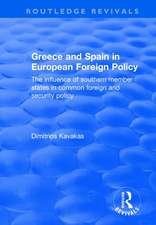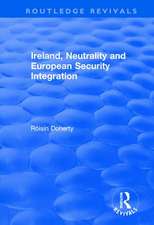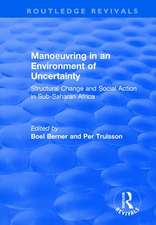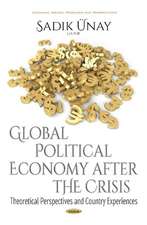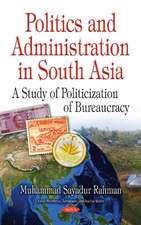Governing Hybrid Organisations: Exploring Diversity of Institutional Life
Autor Jan-Erik Johanson, Jarmo Vakkurien Limba Engleză Paperback – 11 sep 2017
Governing Hybrid Organisations presents an engaging discussion around hybrid organisations, highlighting them as important and fascinating examples of modern institutional diversity. Chapters examine the changing landscape of service delivery and the nature and governance of hybrid organisations, using international examples and cases from different service contexts. The authors put forward a clear analytical framework for understanding hybrid governance, looking at strategy and performance management.
This text will be valuable for students of public management, public administration, business management and organisational studies, and will also be illuminating for practising managers.
| Toate formatele și edițiile | Preț | Express |
|---|---|---|
| Paperback (1) | 410.50 lei 6-8 săpt. | |
| Taylor & Francis – 11 sep 2017 | 410.50 lei 6-8 săpt. | |
| Hardback (1) | 763.78 lei 6-8 săpt. | |
| Taylor & Francis – 11 sep 2017 | 763.78 lei 6-8 săpt. |
Preț: 410.50 lei
Nou
Puncte Express: 616
Preț estimativ în valută:
78.55€ • 82.01$ • 65.01£
78.55€ • 82.01$ • 65.01£
Carte tipărită la comandă
Livrare economică 04-18 aprilie
Preluare comenzi: 021 569.72.76
Specificații
ISBN-13: 9781138655829
ISBN-10: 1138655821
Pagini: 200
Ilustrații: 6 Tables, black and white; 9 Line drawings, black and white; 9 Illustrations, black and white
Dimensiuni: 156 x 234 x 15 mm
Greutate: 0.32 kg
Ediția:1
Editura: Taylor & Francis
Colecția Routledge
Locul publicării:Oxford, United Kingdom
ISBN-10: 1138655821
Pagini: 200
Ilustrații: 6 Tables, black and white; 9 Line drawings, black and white; 9 Illustrations, black and white
Dimensiuni: 156 x 234 x 15 mm
Greutate: 0.32 kg
Ediția:1
Editura: Taylor & Francis
Colecția Routledge
Locul publicării:Oxford, United Kingdom
Public țintă
Postgraduate, Professional, and UndergraduateCuprins
Table of contents
List of Figures
List of Tables
1 Monsters on the run: Introduction to governing hybrid organisations
2 Why do monsters exist? Public, private, and hybrid organisations in perspective
3 How to tame monsters? Hybridity and its variants
4 Setting the path for monsters: How do hybrids explore their strategic options and objectives?
5 Tracing the footprints of monsters: The performative orientation of organisations
6 Chartering the terrain of monsters: Exploring strategy-performance interfaces in hybrid activities
7 Are they monsters after all? Understanding the governance of hybrid organisations
References
Index
List of Figures
List of Tables
1 Monsters on the run: Introduction to governing hybrid organisations
2 Why do monsters exist? Public, private, and hybrid organisations in perspective
3 How to tame monsters? Hybridity and its variants
4 Setting the path for monsters: How do hybrids explore their strategic options and objectives?
5 Tracing the footprints of monsters: The performative orientation of organisations
6 Chartering the terrain of monsters: Exploring strategy-performance interfaces in hybrid activities
7 Are they monsters after all? Understanding the governance of hybrid organisations
References
Index
Recenzii
"Increasingly, the scholarly and practitioner communities recognize the organizational and social significance of hybrid organizations and processes of 'hybridity.' But theory and research have not kept pace with the rapid development of hybrids. Not until now. The authors provide a big step forward in our understanding of the causes, workings and implications of hybrid organizations. Their work is deeply informed by contemporary organization theory but also goes beyond it with a penetrating analysis of the social meaning of these new myth-breaking organizations. The book should of interest to anyone interested in hybrid organizations...or organizations, period." - Barry Bozeman, Director, Center for Organization Research and Design, Arizona State University, USA
"Hybrid organisations flourish everywhere. For government agencies, hybridising with private businesses can enrich the capacities of government but also add extra layers of complexity. In this book, Johanson and Vakkuri offer a nuanced interpretation of the governance of hybrids. If you are interested in hybrid organisations, read this book." - Irvine Lapsley, Professor of Accounting Emeritus, University of Edinburgh, UK
"Hybrid organisations flourish everywhere. For government agencies, hybridising with private businesses can enrich the capacities of government but also add extra layers of complexity. In this book, Johanson and Vakkuri offer a nuanced interpretation of the governance of hybrids. If you are interested in hybrid organisations, read this book." - Irvine Lapsley, Professor of Accounting Emeritus, University of Edinburgh, UK
Descriere
This book presents an engaging discussion around hybrid organisations, highlighting them as important and fascinating examples of modern institutional diversity. The authors put forward a clear analytical framework for understanding hybrid governance, looking at strategy and performance management.
